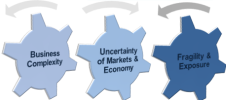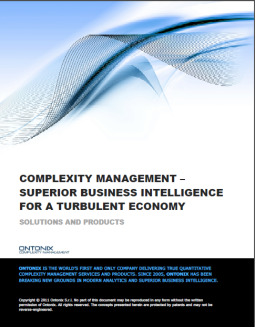Presentation: deeper understanding by thinking in systems
Friday, 30 September, 2011 Leave a comment
“Systems thinking” can help with the understanding of so much in our lives that, we either take for granted, or are content to leave in the “domain” of Academics, experts and specialists. I thought this an excellent presentation on the subject and one that may “whet the appetite” to learn more about the complexity of non-linear systems.
Business owners, finance and risk professionals who continue to think predominantly in terms of linear processes will only succeed in increasing uncertainty in the environments in which they operate…and beyond!
Why? Because it is much easier to stick with an engrained belief system (Mental Model), particularly one that is widely accepted, understood and applied than it is to question or challenge the norm. Contrarians are as welcome as whistleblowers in firms with something to hide!
What systems thinking illustrates is that, we need to reconsider much of what we know – or thought we knew – about “risk”. We don’t exist in a “Gaussian world” that fits neatly into a bell curve. The fact is that “outliers” in data cannot be discounted. Rare events do happen and their impact can be disproportionately large.
Why change? In short, contrary to what we had assumed, we aren’t looking at series’ of independent events and Probability theory of Gaussian loss distributions but dealing with interdependent time-variant parameters, multiple regimes , non-equilibrium, tail risk, etc. The invaluable lesson is that we don’t know nearly as much as we thought we did and can be easily misled by historic data relating to a different and past era:
We have a single history but multiple futures that will be shaped by us but only determined by factors outwith the scope of our control or influence.
As individuals we aren’t very good at accepting that we don’t know as much as we thought but it is even more difficult to take when your status (and income) as an expert in a particular field is “threatened” by new knowledge. The resistance within Corporations and Institutions which, by definition, are peopled (almost entirely) by like-minded individuals should not come as a surprise. One of the dangers of self-similarity…and a good justification for encouraging the opinions of contrarians!
A system consists of multiple, varied, “units” upon whose interdependent operations it is reliant – it is of little consolation that tests reveal that your brain, lungs and liver are in great condition if your heart fails! When we measure the performance of “units” (at a single scale) as if they are independent we are unable to determine the true state of health of the system. Nor are we able to trace and track causality relating to internal changes in the system that are first manifest in the measure of system complexity.
Ontonix technology is the only objective, quantitative, means by which the health of a system can be determined and,as a result, maintained in a robust state.












